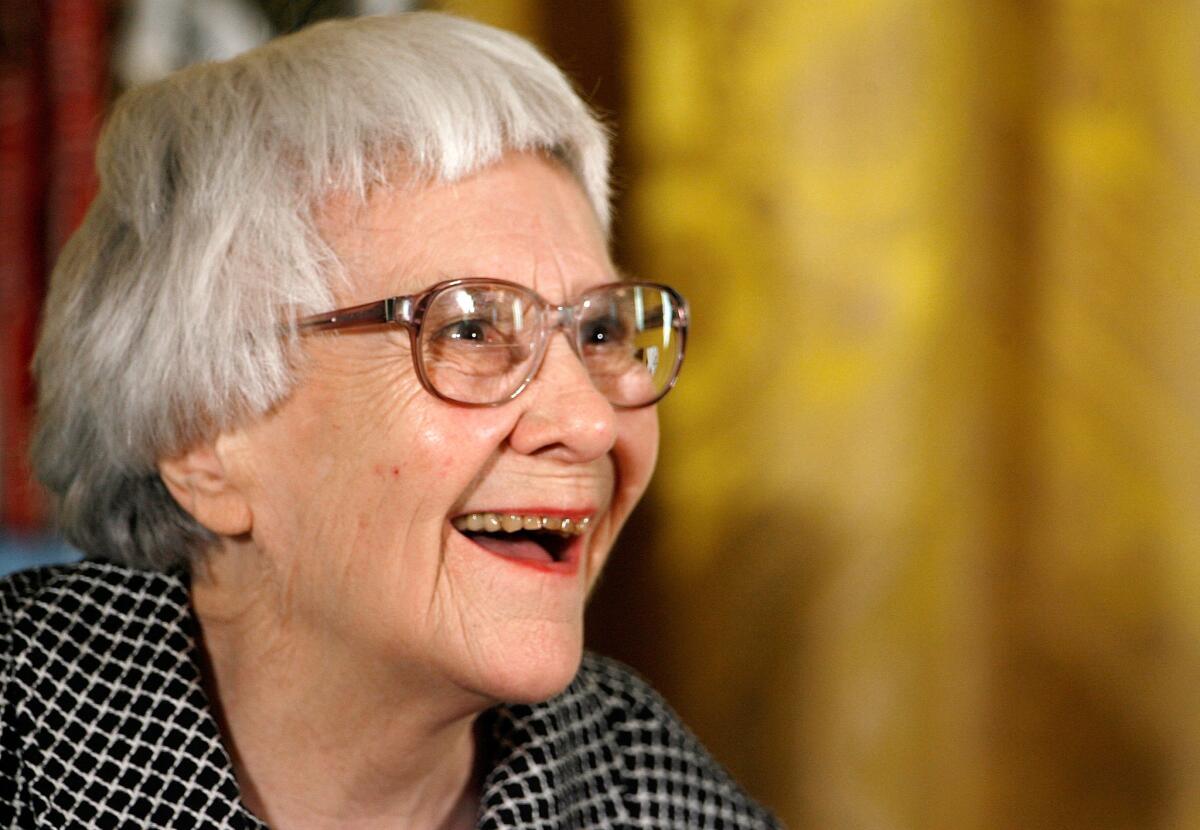Op-Ed: Harper Lee’s Maycomb: The thrill is back

“Did you hear? Is it true?”
Texts, Twitter, emails and Facebook blew up with the news of a new book by Harper Lee called “Go Set a Watchman” coming out in July. It would be a kind of sequel to “To Kill a Mockingbird,” with the adult Scout returning home to Maycomb.
In all the hoopla and excitement, I thought back to another day in Lower Alabama (the other L.A.), when folks gathered to watch Fannie Flagg receive the Harper Lee Award in 2012 at the Alabama Writers Symposium.
The sweet tea flowed as a pianist played a somnolent version of “Memory” from “Cats,” but then a low buzzing sparked the humid air of the Monroeville Community House.
------------
FOR THE RECORD:
Book title: An op-ed on Thursday about Harper Lee had the title of her new book as “To Set a Watchman.” It is “Go Set a Watchman.”
------------
Urgent whispers flew back and forth: “It is true?” “She is here, I’m telling you. Harper Lee is here.” “Oh my Lord.”
I turned and there she was being wheeled inside, wearing a T-shirt, beaming at folks, her white hair shining in front of the big bay window of sunlight. This was the great reputed recluse, Harper Lee?
As the reality sunk in, people raced to reach her. I froze and turned to the woman across from me and said, “I can’t believe she’s really here.”
“Who?” She looked around, confused.
“Harper Lee,” I whispered.
“What? Harper Lee’s alive? Oh my God! She’s the reason I write my stories.” The woman burst into tears and was gone in a shot with her camera.
A kind of ethereal joy swept through the crowd at having Lee come out. It felt a little bit like the Second Coming.
Not unlike the very unexpected news of “Go Set a Watchman” and the joy in all the possibilities of revisiting the world of Maycomb with an adult Scout Finch. We get to go back again. We will get to see Lee’s young writer’s imagination exploring the stories of her childhood and finding her voice.
The day that Fannie Flagg won the Harper Lee Award, she talked about her own struggle to write “Fried Green Tomatoes.” She said editors told her repeatedly that nobody wanted to read a story about an old lady in a nursing home.
So she was feeling terribly discouraged in New York City, and on her way to her chiropractor one morning, somebody on the street called her “ugly,” which hurt her feelings. She went to the appointment, and a man there saw that she was visibly upset. She told him that she was from Alabama, where people had manners.
He agreed, and they started talking. It turned out that he was from Alabama, too, and he offered her a ticket to hear Eudora Welty speak that night.
Flagg accepted the ticket and it was a lovely evening of Welty’s Mississippi stories. Afterward, she went to thank the man, who was standing outside the theater. He was with a white-haired lady who extended her hand and said, “How do you do, I’m Nelle Harper.”
Flagg said she knew enough not to gasp or faint. Over drinks later, Harper Lee asked her what her book was about, and when Flagg described the premise of “Fried Green Tomatoes,” Lee advised her to stick with it because an old lady in a nursing home sounded like a real good book. Lee’s words gave her the courage she needed to keep going.
Lee’s Atticus Finch described courage this way: “It’s when you know you’re licked before you begin, but you begin anyway.”
And so Lee’s second book is coming out, the one she wrote first and had to find the courage to write. Upon reading that manuscript, her editor, Tay Hohoff, advised her to channel her stories to a younger narrator, which became “To Kill a Mockingbird.” But it will be a gift to experience this new book as its own work of art.
At that conference in 2012, Alabama’s historian emeritus, Wayne Flynt, was also a speaker. He is a close of friend of Harper Lee and visits her regularly. Flynt said that what made a full life, according to a sociologist advising academics to flee their ivory towers, were three things: our family and friends; our work; and a place that makes us feel uncomfortable — a place where we spend time with people not a thing like us and take the time to listen to their stories.
That’s what Lee did by capturing the different and uncomfortable worlds of “To Kill a Mockingbird”: The Robinsons, the Ewells, the Cunninghams, the Finches and so many more.
It’s what has drawn me back to the South again and again, a place I want to understand even when it makes me uncomfortable — a place where you often get a story whether you want one or not.
Flynt encouraged us to find the courage to find the places that made us uncomfortable where we might also unexpectedly find home.
And isn’t that what that the fictional town of Maycomb made us feel at times — uncomfortable, fearful and thrilled? We got to live in the pages with Scout, Atticus, Jem, Dill, Calpurnia, Aunt Alexandra and Cousin Francis and Boo Radley. With the gift of Lee’s new book, we get to revisit that world and in a way go home again.
Kerry Madden is on the creative writing faculty at the University of Alabama, Birmingham, and the author of “Up Close: Harper Lee.”
Follow the Opinion section on Twitter @latimesopinion and Facebook
More to Read
A cure for the common opinion
Get thought-provoking perspectives with our weekly newsletter.
You may occasionally receive promotional content from the Los Angeles Times.






